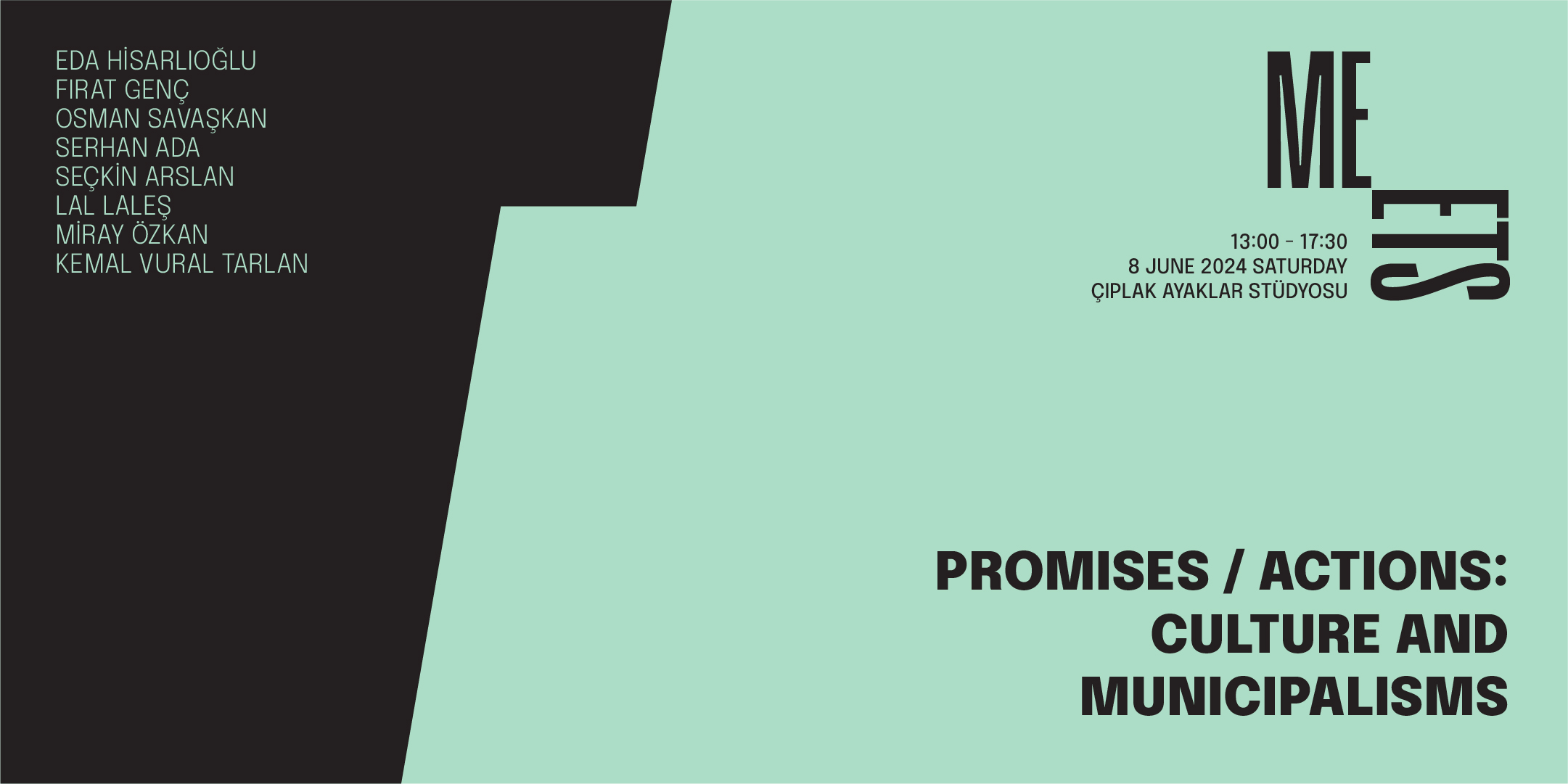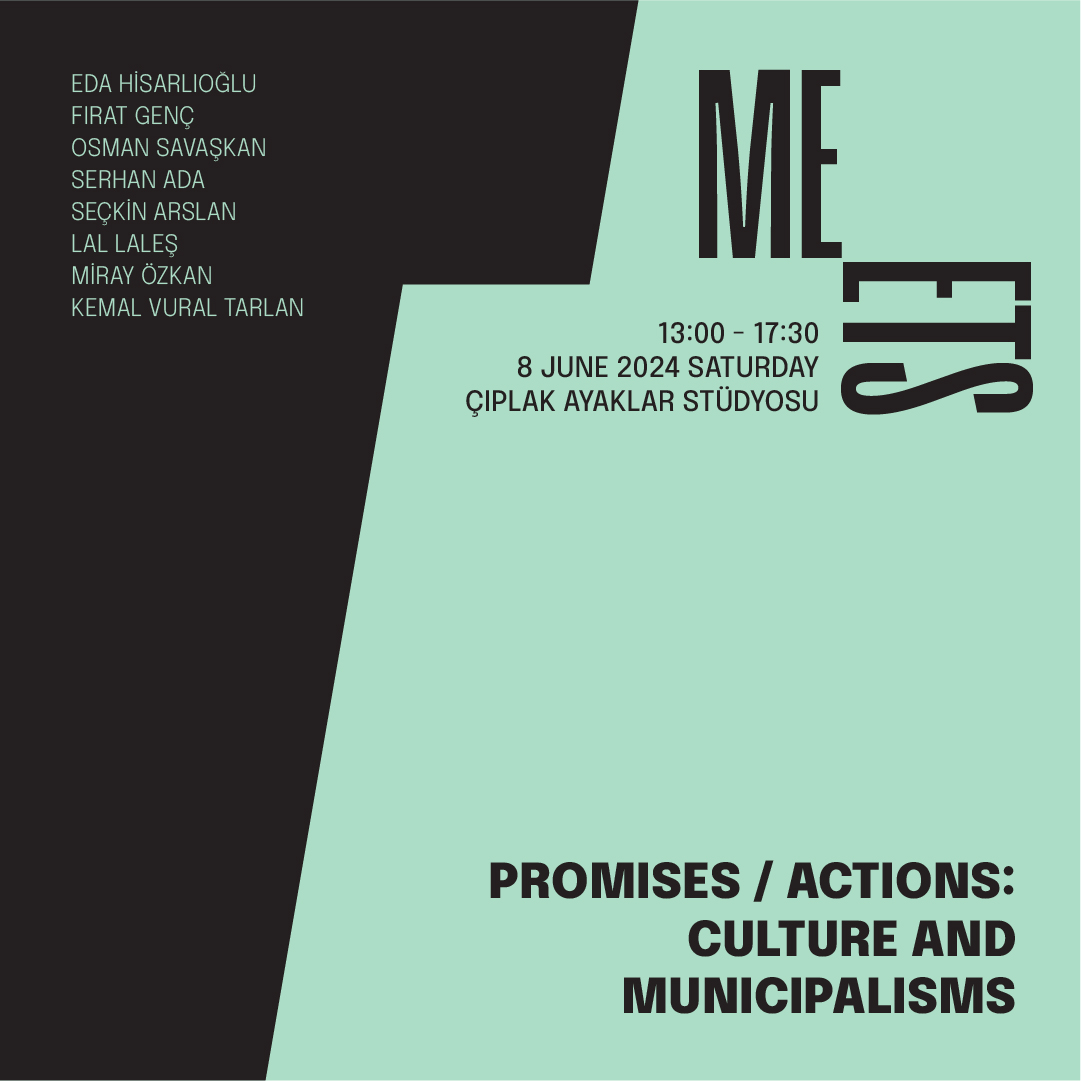

PROMISES / ACTIONS: CULTURE AND MUNICIPALISMS
8 JUNE 2024 Saturday
13:00 - 17:30
Çıplak Ayaklar Stüdyosu
- Meets
The long-term contraction in mainstream politics in Turkey has led to increased interest in local governments. In tandem with global trends, municipalities have found themselves at the center of political appeals and demands fed through different channels. Local governments draw attention and intrigue, but they also draw criticism fed by varying degrees of interactions. When the provocativeness of promises and actions is combined with instrumentalist approaches, the kind of autonomous spaces desired by cultural producers cannot be attained. It would not be wrong to anticipate that many actors’ relationships with municipalities will be reshaped following the results of recent local elections. While the process of healing and reconstruction has the potential of creating new collaborations, it also carries the risk of cultural actors being exploited for short-term pragmatic interests.
This meeting, conceived by Eda Hisarlıoğlu ve Fırat Genç for KIRIK, is an invitation to examine how cultural actors engage with the municipalities that have emerged in Turkey over the past twenty years. There will be a thorough discussion of the distinctions and similarities between various municipal understandings as well as the disappointments and critiques brought forth by varying degrees of interactions. In the light of experiences of cultural actors from Diyarbakır, Gaziantep, İstanbul and İzmir, we intend to explore the potentials and constraints, as well as attitudes, discourses and imaginations of local governments from various political traditions.
Program
13:00 – 14:00
MUNICIPALISM IN PRESENT DAY TURKEY: STRUCTURES, ACTORS, TENDENCIES.
Osman Savaşkan
14:00-14:20
Tea, coffee break
14:20-15:40
DISCUSSION
Moderation: Eda Hisarlıoğlu & Fırat Genç
Serhan Ada, Seçkin Arslan, Lal Laleş
15:40-16:00
Tea, coffee break
16:00-17:30
DISCUSSION
Moderation: Eda Hisarlıoğlu & Fırat Genç
Miray Özkan, Kemal Vural Tarlan
Osman Savaşkan received his bachelor’s degree in Political Science and International Relations from Marmara University his master’s and Ph.D. degrees from Boğaziçi University’s Atatürk Institute for Modern Turkish History. During his doctoral studies, he was a visiting fellow at the Kennedy School of Government at Harvard University. He is currently working as an associate professor at the Department of Local Governments at Marmara University. His articles on state-capital relations, local governments, urban politics and migration issues have appeared in many different journals. He is also the author of the book entitled New Capitalism in Turkey: The relationship between Politics, Religion and Business (with Ayşe Buğra) and the editor of Turkey’s Great Transformation: A Tribute to Ayşe Buğra (with Mehmet Ertan).
Assoc. Prof. Serhan Ada is a faculty member at İstanbul Bilgi University, Department of Culture and Arts Management, Director of the Cultural Policy and Management Research Centre and UNESCO Chair in Cultural Policy and Cultural Diplomacy. He was the Coordinator of Major Projects for the European Capital of Culture İstanbul 2010. Since 2024, he is chairman of the Scientific Board of the Regional Bureau of UNESCO. In 2023, he was appointed as the President of İzmir Mediterranean Academy. Ada gave lectures and seminars as a guest lecturer at various universities in Germany, France, Italy, USA, Lebanon and England. Since 2009, he has contributed to the development of İzmir’s cultural policy, first as Cultural Advisor of the Metropolitan Municipality, then as Culture and Art Coordinator of the Mediterranean Academy and as UCLG expert for Agenda 21 Pilot City for Culture. He is the editor-in-chief of Kültür Politikası Yıllık [Culture Policy Yearbook] published in Turkish and English, as well as the editor-in-chief of Meltem, the peer-reviewed journal of the İzmir Mediterranean Academy. Among the publications he has contributed to as editor and author are the Cultural Policy Report on Turkey from the Perspective of Civil Society (2011), Introduction to Cultural Policies in Turkey (2009), İstanbul’s Festivals (2011), Emerging Cultural Continent: Actors and Networks (2008). Ada curated the exhibition Etel Adnan: Impossible Homecoming, at the Pera Museum, in 2021.
Lal Laleş is a poet, translator, editor, publisher, born in Mardin in 1975, living in Diyarbakır. She graduated from Dicle University, Department of History. Between 1993 and 2006, she worked as a playwright and dramaturg in independent theatre groups. As one of the leading figures of contemporary Kurdish poetry and Kurdish language rights activism, he published his first book of poetry in Turkish in 2023, following three books of poetry written in the Kurmanji dialect of Kurdish. His poems have been translated into Turkish, Arabic, Swedish and English and published in many periodicals. He is the founder and director of Lîs Publications, which has been publishing in Kurdish in Diyarbakır since 2004, and Diyarbakır Literature House since 2020. He translates poetry from Turkish into Kurdish, which has been collected in eight books within Lîs Publications, and serves as the editor-in-chief. He continues his efforts to strengthen the Kurdish language in the context of democratic values, cultural rights and the right to language from a place that believes in dialogue and democratic representation, with important roles in democratic platforms such as the Turkish Publishers Association and the Publishers Cooperative.
Born in Diyarbakır in 1982, Seçkin Arslan is currently based in Gaziantep. Following her bachelor’s degree in business engineering, she took courses on philosophy and social anthropology. Since the 2011 Van earthquake, she has been involved in civil society work. In Van, she worked on women’s rights and tangible Armenian cultural heritage, and in Gaziantep on access to education and rehabilitation of Syrian university students. She is also involved in the establishment and institutionalization process of Nefes, an arts & culture association for giving Syrian artists in Gaziantep access to the city’s culture and arts scene. Since 2019, she has been undertaking all coordination and facilitation roles -from establishment to institutionalization- in the Diyarbakır based Wêjegeh Amed.
After completing her undergraduate studies in City and Regional Planning at Middle East Technical University, Miray Özkan pursued a master’s degree in Urban Design at the same university. She conducted her doctoral research on Urban Transformation Policy in Turkey in between 2000-2017 at the City and Regional Planning Department of İstanbul Technical University. Since 2005, she has worked as an urban planner in İstanbul, carrying out projects for municipalities, public institutions, and non-governmental organizations. These projects included the İstanbul Environmental Plan, Kartal Urban Transformation Project, vision and strategy plans, social impact assessments and workshops for cities such as Denizli and Afyon, as well as various districts of İstanbul. Between 2020 and 2023, she served as the Participation Coordinator at the İstanbul Metropolitan Municipality City Planning Department, where she coordinated participatory planning projects such as the Adalar Strategy Document and Beyoğlu Spatial Strategy Plan. Since 2023, she has been working as a co-founder of Mesken, conducting projects in urban planning, strategy development, policy production and citizen and stakeholder engagement and communication across Turkey. Additionally, she works as a part-time lecturer in the Architecture Department at İstinye University.
Kemal Vural Tarhan has been conducting visual sociology and anthropology studies on Dom communities living in the Middle East, since 2000. His work, articles and photographs have been featured in many international symposiums, congresses, exhibitions, books and events. Since 2011, he has been working and researching on Syrian refugees, migration theories, social cohesion and coexistence. He lives in Gaziantep and continues his work in the field of civil society as the General Coordinator of Kırkayak Kültür. He is a board member of the Lebanon based CCRM (Cross-Regional Centre for Refugees and Migrants) network.
Eda Hisarlıoğlu is currently working at Goethe-Institut Istanbul as the project coordinator of Spaces of Culture. She is a part of the Amsterdam-based platform Failed Architecture’s core editorial team while completing her master degree at Kadir Has University at the Architectural and Urban Studies Program. Hisarlıoğlu has a background in architecture from İstanbul Technical University and completed the nine months training of Open Dialogue in curatorial studies. Since 2016, she has been working in the field of arts and culture, taking on different roles, such as researcher and exhibition producer and collaborating with several institutions and artists.
Fırat Genç is assistant professor at the Department of Sociology in İstanbul Bilgi University, Turkey. He holds a PhD in History of Modern Turkey from Boğaziçi University. Genç’s books published in Turkish are Turkey of Cities: Prospects, Limits and Conflicts (with Çağlar Keyder, Fuat Keyman and Ayşe Köse Badur; İletişim, 2021) and Indivisible Unity of the Nation: Nationalisms that Shatter in the Process of Democratization (with Ferhat Kentel and Meltem Ahıska; TESEV, 2007); and the co-edited volume Property and Commons: The Making and Unmaking of Private Property in Turkey (with Begüm Özden Fırat; Metis, 2023). His research focuses on urban studies, spatial politics, social movements, Kurdish issue, nationalism, and international migration.
Part of a program on culture wars and cultural hegemony.
We thank Çıplak Ayaklar Stüdyosu for providing the venue.
KIRIK’s 2023/24 programs are supported by the SAHA Sustainability Fund.